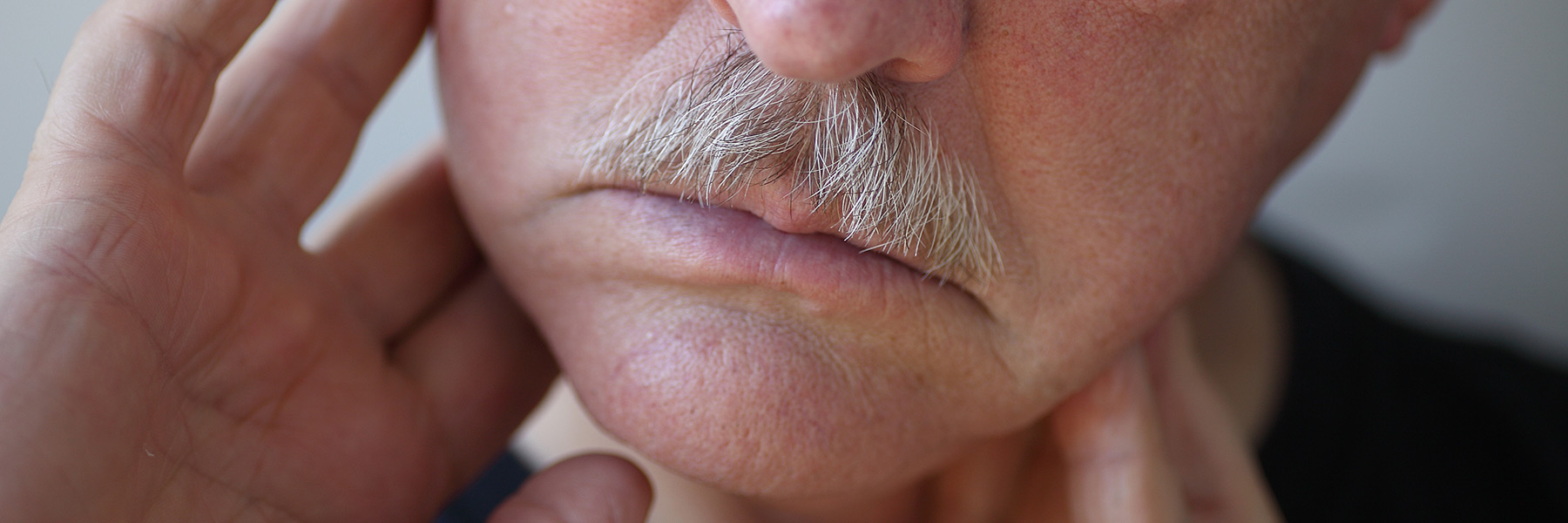What Causes My Jaw Pain?

You’ve probably heard someone say “I have TMJ” when referring to a common type of jaw pain.
Actually, everyone has a TMJ, which stands for temporomandibular joint. This describes a couple of joints and connective muscles in your jaw. If they become inflamed or spasm, it can hurt. The disorder can cause symptoms such as aching in the jaw, cheek, teeth, or ear.
What does TMJ pain disorder feel like?
“Almost all patients with a TMJ disorder describe pain,” says Jose W. Ruiz III, M.D., an otolaryngologist (ear, nose, and throat specialist) with the University of Miami Health System. “This pain can be dull and is usually on one side of the head. It worsens after chewing and can become sharper, jabbing, and more intense. The jaw muscles can feel tired or heavy.”
Symptoms can also include:
- aching or burning in the jaw on one or both sides of the face
- soreness in the chewing muscles or tongue
- radiating pain in the face, jaw, or neck
- ear pain
- stiff jaw muscles
- limited range of motion in the jaw opening
- painful clicking, popping, or grating in the jaw joint when opening or closing the mouth
- jaw may even lock
- a change in the way the upper and lower teeth fit together
- headaches (typically on the side of the head, may move to the jaw area)
What causes jaw pain?
- injury to the jaw or temporomandibular joint
- teeth clenching
- teeth grinding when sleeping (called bruxism)
- excessive chewing (gum, ice, or hard foods)
- anatomical misalignment in the face/jaw
- arthritis in the facial joints
- poor head and cervical posture
- psychological factors, such as anxiety or depression
How can you tell if my jaw pain is related to TMJ?
There isn’t a single diagnostic test to identify TMJ disorder. Your dentist or primary care physician can help identify the cause of your pain. Your healthcare provider should ask about your medical history and some symptoms that may seem unrelated to your jaw but can help with a diagnosis. They may recommend an x-ray to rule out other issues. You may be referred to an otolaryngologist [ear, nose, and throat (ENT) specialist] or oral/maxillofacial specialist to provide appropriate treatment.
“Most patients I see with ear pain without hearing loss or draining from the ear have TMJ,” Dr. Ruiz says. However, some sinus and ear infections can cause pain that feels very similar to TMJ pain. That’s why a doctor’s evaluation is needed.
The University of Miami Health System offers advanced dentistry services, oral/maxillofacial surgical options, ENT specialists, and pain management for musculoskeletal disorders, including facial/dental pain.
Can a doctor cure my TMJ disorder?
“Most patients with temporomandibular [or TMJ] disorder have improvement over time, and many respond well to conservative treatment,” Dr. Ruiz says. “Your initial approach should be the following self-care techniques.”
- avoid triggers like chewing gum, nail-biting, and pen-chewing
- apply an ice pack (can reduce swelling and pain)
- apply a warm compress (helps relax muscles)
- eat a diet of soft foods (avoid hard foods)
- reduce stress with relaxation exercises
- make a conscious effort to avoid teeth clenching
- release jaw tension with gentle muscle stretching or massages
- avoid overextending your jaw joints with wide yawning or singing
- practice optimal head and neck posture
“If your pain does not improve with these efforts, it’s essential to identify and correct what’s triggering it,” Dr. Ruiz says.
Conservative medical treatment options for jaw pain include:
- wear a bite guard or teeth stabilization splint while you sleep (if clenching or grinding is the problem)
- over-the-counter, nonsteroidal anti-inflammatory drugs (such as ibuprofen)
- prescription muscle relaxants
- prescription tricyclic antidepressants
Constant aching in the head, ears, or jaw can feel debilitating. If your TMJ pain doesn’t respond to more conservative medical treatments, speak to your health care providers about the following options.
- injections to trigger points, Botox, or injection into the joints
- surgery or surgical implant for structural problems not improving with other therapies
- physical therapy (gentle stretching, strengthening, posture evaluation, massage, and therapeutic heat and ice packs)
- acupuncture
- chiropractic adjustments to the neck, jaw, and shoulders
- psychological evaluation if depression, stress, or anxiety are present
Dana Kantrowitz is a contributing writer for UMiami Health News.
Tags: Dr. Jose Ruiz, jaw pain, painful jaw
